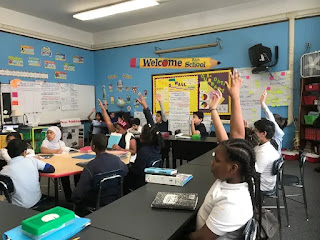What does money really have to do with it?
Unfortunately, a lot. The way the funding is set up for the education system in Texas is highly flawed which leads to disparities within different schools/school districts. Firstly, there is a set amount of money that the state sets that is supposed to be how much each student gets each year. However, this number is not adjusted for inflation. Additionally, over half of the money that schools get is from property taxes of the surrounding community. This means schools in wealthier areas tend to receive more money, which is clearly inequitable. Not to mention that this is not only disproportionately affecting impoverished students, but also students of color since there is a higher population of minorities living in poorer areas due to generations of racism, segregation, and gate-keeping of wealth. Some of the affects of less funding in schools are that teachers earn lower salaries (which leads to fewer experienced teachers, more vacancies that are filled with substitutes, and fewer teachers trained in the subject they are teaching), there is less access to computers, larger class sizes (therefore higher student to teacher ratios), outdated or lack of learning materials and resources, and the school itself not being a conducive learning environment (no ac, roaches/rats, non-functioning bathrooms, excessive dirtiness, etc).
However despite these set backs it is important to not make assumptions about students who are facing poverty. People often associate lower-income students with stereotypes such as laziness, apathy towards school and learning, and lower abilities to achieve, and drug/alcohol abuse. Though, these are simply not true. Low income families tend to actually work more and earlier on which grants them less time to get involved in schools, tend to to have fewer resources and time (as previously mentioned) which can contribute to struggling with assignments, and actually tend to have less abuse of drugs and alcohol than their wealthier counterparts (keep in mind the over-policing of impoverished and minority areas). Impoverished students have the same abilities as wealthier students and by buying into these stereotypes you are contributing to further perpetuating the cycle of poverty. This is why it is so important to educate yourself about poverty, not make assumptions about students just because of their household income, include lesson plans that are inclusive to everyone's situation, and fight for funding reform and programs that help students in need.
Sources:
Separate and Unequal: School Funding in ‘Post-racial’ America
Texas' school finance system is unpopular and complex. Here's how it works


Hi Alissa! I was surprised to learn that over half the money funding public schools come from property taxes. This, as you stated, clearly is so inequitable. I had not really seen how inequitable school funding was until this unit, as I grew up in a well funded school district. I also read about the myths of poverty and agree with you, it is vital that we do not make generalizations about those living in poverty. I like how you mention the over policing of impoverished areas as a reason why people in poverty are seen as having higher rates of drug use because I completely agree. The injustices these people experience is absurd, I hope as future teachers out education on these facts can at least be a step forward into making a change. I hope policies can be put in place to make school funding equitable for all, as ALL children deserve a good fair education.
ReplyDeleteHi Alissa! I love that you started with the flaws in our Texas school systems because while our state is one of the better states at making education and schools a priority, of course there are schools that slip through the cracks. Even though there are many that see our great state as superior compared to the other 49 states, there are many flaws in our school systems. I personally was in a school system that did not have a funding issue but if you drove 30 minutes down the road, you would see schools or school districts that are struggling. It was not something that I ever had to worry about in my school and I did not know anyone who was in a district that did, but as a future teacher it is something that I have to worry about. Despite the lack of funding, if I were to teach in a district that had a lack of funding, I would do everything that i could to give my students the education that they need deserve. I did know that a good amount of the money that school receive came from property taxes but I wonder why the money is not more evenly distributed so there are no schools that have funding issues.
ReplyDelete